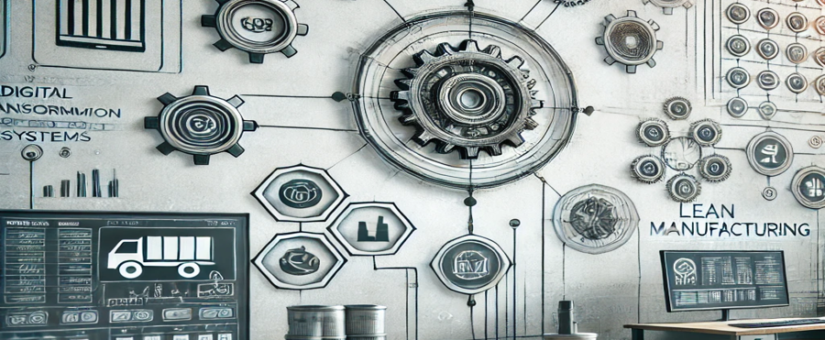
What is Lean MRP? A Practical Guide for Manufacturing Managers
- On 12/13/2024
For many manufacturing managers, the question isn’t whether to adopt lean principles but how to implement them effectively without overriding their existing systems. That’s where Lean MRP comes into play.
Lean MRP bridges the gap between traditional Enterprise Resource Planning (ERP) systems and lean manufacturing principles, offering a practical approach to achieving operational excellence. This article explores what Lean MRP is, how it works, and why it’s a game-changer for manufacturing managers.
The Challenge: ERP vs. Lean Manufacturing
ERP/MRP systems have long been the backbone of manufacturing planning, enabling businesses to calculate material requirements, manage inventories, and schedule production activities. However, these systems often face criticism for their rigidity and complexity, particularly in environments with high variability or frequent changes in demand.
On the other hand, lean manufacturing emphasizes flexibility, waste reduction, and continuous flow—principles that often seem at odds with traditional MRP planning. The result? Many manufacturers struggle to reconcile the two approaches, leading to inefficiencies, material shortages, and missed deadlines.
What is Lean MRP?
Lean MRP is a production scheduling and control methodology pioneered by Altemir Consulting that combines the best elements of both worlds. It uses the structure and data-driven capabilities of ERP systems to support the flow-based, waste-reducing goals of lean manufacturing. Instead of treating them as opposing philosophies, Lean MRP aligns ERP’s strengths with lean principles to create a more responsive and efficient manufacturing process.
Key characteristics of Lean MRP include:
- Pull-Based Scheduling: Instead of pushing work orders based on production schedules, Lean MRP uses real-time demand signals to manage work centers as a collection of kanbans.
- Dynamic Adjustments: Lean MRP enables quick responses to changing conditions without destabilizing the entire production plan.
How Does Lean MRP Work?
Lean MRP doesn’t require a new system; it requires a new approach. Here’s how it works:
- Focus on Data Quality: Ensure that inventory records, BOMs (Bills of Materials), and routing data are clean and accurate. Lean MRP relies on reliable data to make informed decisions.
- Stabilize the Production Schedule: Manage the production schedule so that it expresses customer demand for each and every manufacturing work center and external supplier.
- Introduce Virtual Kanbans: Use the ERP production schedule to drive kanban signals that pull materials through the production process.
- Leverage Real-Time Metrics: Implement dashboards and reporting tools to track key performance indicators (KPIs) like on-time delivery, lead time reduction, and inventory turns at the work center level.
Why Lean MRP is a Game-Changer
Manufacturing managers who adopt Lean MRP often see dramatic improvements in operational performance. Here’s why:
- Improved On-Time Delivery: By aligning production schedules with actual demand, Lean MRP reduces delays and ensures that customer commitments are met.
- Lower Inventory Levels: Lean MRP minimizes excess inventory by synchronizing material purchases with production needs, reducing carrying costs and waste.
- Increased Agility: Manufacturers can adapt quickly to changes in customer demand or supply chain disruptions without compromising efficiency.
- Enhanced Customer Satisfaction: Improved schedule stability enables clearer priorities that are rigidly connected to customers' requirements. Customer commitments become self-actualizing.
Real-World Success: Lean MRP in Action
Consider the case of an aircraft manufacturer struggling with on-time delivery rates below 30%. By implementing Lean MRP, the company:
- Improved on-time delivery to nearly 100%.
- Reduced lead times by streamlining production schedules.
- Enhanced capacity planning using accurate load and capacity metrics.
This transformation not only satisfied customers but also positioned the company as a reliable partner in a competitive market.
Conclusion
Lean MRP is an Altemir Consulting innovation that offers a powerful solution for manufacturing managers seeking to combine the precision of ERP systems with the flexibility of lean manufacturing. By adopting this methodology, you can enhance efficiency, reduce waste, and meet customer demands with confidence.
Ready to transform your operations? Learn more about how a lean manufacturing consulting firm like Altemir Consulting can help you implement Lean MRP and achieve operational excellence.
Schedule a discovery call today.
